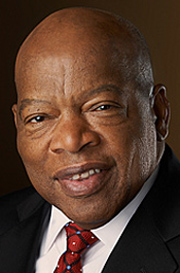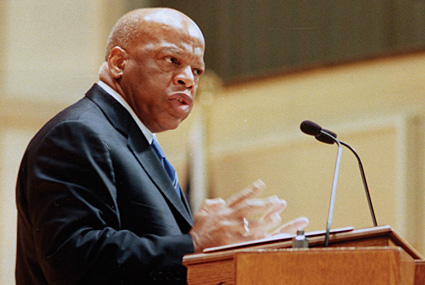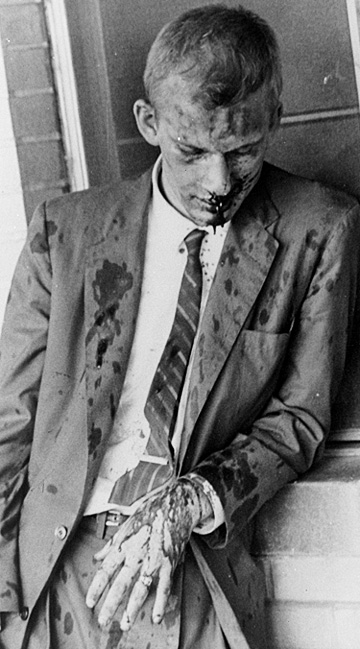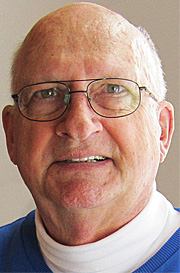In recognition of the 50th anniversary of the historic Voting Rights Act, Lawrence University will honor two civil rights pioneers who were instrumental in the passage of that legislation.

Congressman John Lewis, an iconic figure in civil rights activism, and Appleton native James Zwerg, one of the courageous Freedom Riders of the early 1960s, will each receive honorary Doctor of Humane Letters degrees June 14 at the college’s 166th commencement. Lewis also will deliver the principal commencement address.
This will be Lewis’ third appearance at Lawrence. He first visited in April 1964 as Head Field Secretary of the Student Nonviolent Coordinating Committee to speak at a campus-sponsored “Civil Rights Week” event. He returned in February, 2005 to deliver the university convocation “Get in the Way.”
“Becoming an engaged citizen is one of the central tenets of a liberal arts education and so we are proud to celebrate the 50th anniversary of the passage of The Voting Rights Act of 1965 at this year’s commencement, which provided a path to an essential right for many people in this country,” said President Mark Burstein. “We look forward to welcoming Congressman Lewis back to campus and having Mr. Zwerg represent local participation in the events that led up to the legislative passage of The Act.”

Lewis has represented Georgia’s Fifth Congressional District since 1986. He has been at the forefront of the Civil Rights Movement for more than 50 years, beginning with sit-in demonstrations at segregated lunch counters in Nashville, Tenn., he organized as a student at Fisk University.
A participant in the 1965 march from Selma, Ala., to the capital in Montgomery, Lewis will be among a delegation of more than 90 members of Congress who will visit Alabama the weekend of March 6-8 for ceremonies commemorating the 50th anniversary of the march that became known as “Bloody Sunday” after state troopers attacked marchers on Selma’s Edmund Pettus Bridge.
Chronicled in the 2014 film “Selma,” the march, and its violent conclusion, galvanized the country and hastened the passage of the Voting Rights Act later that year, prohibiting the denial or abridgment of the right to vote nationwide.
“Selma” was nominated for a Best Picture Oscar at last month’s Academy Awards ceremonies while “Glory” from the film’s soundtrack won the Oscar for Best Song.

Lewis, whose forehead still bears a scar from Bloody Sunday, has spent his entire adult life fighting injustice and protecting human rights. While still in his early 20s, Lewis had established himself as a nationally recognized leader in the Civil Rights movement, organizing sit-ins and participating in the segregation-challenging Freedom Rides across the South.
As a 23-year old, Lewis helped organize and spoke at the historic 1963 March on Washington, in which Dr. Martin Luther King delivered his “I Have a Dream” speech. Lewis is the lone surviving member among the speakers at that event.
His engagement with the Civil Rights Movement included three years (1963-66) as the chair of the SNCC. He later served as the director of the Voter Education Project, helping to add nearly four million minorities to the voter rolls. In 1977, President Jimmy Carter appointed Lewis head of ACTION, the federal volunteer agency.
Lewis’ efforts and contributions toward building what he as calls “the beloved community” in America have been recognized with dozens of prestigious awards, among them the 2010 Medal of Freedom, the Martin Luther King Jr. Non-Violent Peace Prize, the National Education Association’s Martin Luther King Jr. Memorial Award and the John F. Kennedy “Profile in Courage Award” for lifetime achievement.
A graduate of Fisk University and the American Baptist Theological Seminary, Lewis is the author of “Across That Bridge: Life Lessons and a Vision for Change,” which received the 2012 NAACP Image Award for Best Literary Work-Biography and the graphic novel memoir trilogy “March.”
The first volume of “March” reached no. 1 on the New York Times best-seller list and was included on lists of the best books of 2013 by the Washington Post, Boston Globe, Publishers Weekly, Library Journal, The Horn Book Review, Booklist and others.
The trilogy’s second installment, which examines Lewis’ days as a Freedom Rider, was released last month.

Zwerg, who was born and raised in Appleton, became engaged in the Civil Rights Movement as a 21-year-old exchange student at Fisk University from Beloit College.
While at Fisk, Zwerg participated in lunch counter sit-ins and movie theater stand-ins in Nashville, resulting in repeated verbal abuse and physical assaults. He joined the Freedom Riders in1961 and was arrested and jailed in Birmingham, Ala., and severely beaten in Montgomery, Ala. Photos of Zwerg taken after his beating appeared in Time and Life magazines as well as newspapers around the world.
His efforts were widely chronicled in articles, television documentaries and the book “Freedom Riders: John Lewis and Jim Zwerg on the Front Lines of the Civil Rights Movement.”
Rev. King and the Southern Christian Leadership Conference honored Zwerg in 1961 with the prestigious Freedom Award. He also has been recognized with the Church Women United, USA, Human Rights Award and the Martin-Springer Institute’s Moral Courage Award.
Zwerg graduated from Beloit College in 1962 and later earned a degree in theology at Garret Theological Seminary. Ordained a minister in the United Church of Christ, he served churches in Wisconsin until 1970 when he moved to Tucson, Ariz., to become minister of the Casas Adobes United Church of Christ. Retired, he lives in rural New Mexico.
About Lawrence University
Founded in 1847, Lawrence University uniquely integrates a college of liberal arts and sciences with a nationally recognized conservatory of music, both devoted exclusively to undergraduate education. It was selected for inclusion in the Fiske Guide to Colleges 2015 and the book “Colleges That Change Lives: 40 Schools That Will Change the Way You Think About College.” Engaged learning, the development of multiple interests and community outreach are central to the Lawrence experience. Lawrence draws its 1,500 students from nearly every state and more than 50 countries.